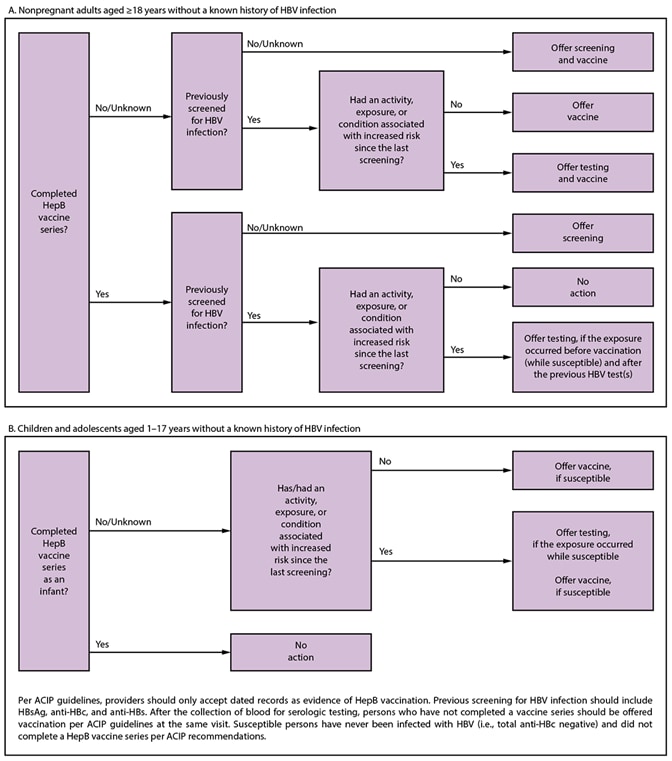Screening and Testing Recommendations for Chronic Hepatitis B Virus Infection (HBV)
CDC recently published updated recommendations for hepatitis B screening and testing. In this publication, “screening” refers to testing people not known to be at increased risk for exposure to HBV. “Testing” refers to conducting serologic tests of people with symptoms or who are identified to be at increased risk for exposure to HBV. These updates expand on the recommendations published in 2008.
Summary of 2023 HBV screening and testing recommendations
Screen all adults aged 18 years and older at least once in their lifetime using a triple panel test New
Screen pregnant people for hepatitis B surface antigen (HBsAg) during each pregnancy regardless of vaccination status and history of testing
Expand periodic risk-based testing to include people incarcerated, people with a history of sexually transmitted infections or multiple sex partners, and people with hepatitis C virus infection New
Test anyone who requests HBV testing regardless of disclosure of risk New
Adults
CDC recommends screening all adults aged 18 years and older for hepatitis B at least once in their lifetime using a triple panel test. To ensure increased access to testing, anyone who requests HBV testing should receive it regardless of disclosure of risk. Many people might be reluctant to disclose stigmatizing risks.
Infants
CDC recommends testing infants born to HBsAg positive people for HBsAg and anti-HBs seromarkers.
Pregnant people
CDC recommends HBV screening for hepatitis B surface antigen (HBsAg) for all pregnant people during each pregnancy, preferably in the first trimester, regardless of vaccination status or history of testing. Pregnant people with a history of appropriately timed triple panel screening without subsequent risk for exposure to HBV (i.e., no new HBV exposures since triple panel screening) only need HBsAg screening.
People at increased risk
CDC recommends testing susceptible people periodically, regardless of age with ongoing risk for exposures, while risk for exposures persists. Including:
- People with a history of sexually transmitted infections or multiple sex partners
- People with hepatitis C infection or a history of hepatitis C virus infection
- People incarcerated or formerly incarcerated in a jail, prison, or other detention setting
- Infants born to HBsAg-positive people
- People born in regions with HBV infection prevalence of ≥2%
- US born people not vaccinated as infants whose parents were born in geographic regions with HBsAg prevalence of >8%
- People who inject drugs or have a history of injection drug use
- People with HIV infection
- Men who have sex with men
- Household contact or former household contacts of people with known HBV infection
- Needle-sharing or sexual contacts of people with known HBV infection
- People on maintenance dialysis, including in-center or home hemodialysis and peritoneal dialysis
- People with elevated liver enzymes
Susceptible people include those who have never been infected with HBV and either did not complete a HepB vaccine series per ACIP recommendations or who are known to be vaccine nonresponders.
Screening tests
CDC recommends use of the triple panel test which includes hepatitis B surface antigen (HBsAg), antibody to hepatitis B surface antigen (anti-HBs), and total antibody to hepatitis B core antigen (total anti-HBc). Prior guidance recommended a single test for hepatitis B surface antigen (HBsAg). Any periodic follow up testing can use tests as appropriate based on the results of the triple panel.
For information on interpreting test results see: Interpretation of Hepatitis B Serologic Test Results (cdc.gov).
Incorporating Hepatitis B Virus Screening and Testing into Clinic Workflow

Related Content
For free continuing education on interpreting HBV serologic tests, see: CDC: Online Serology Training – Hepatitis A–E
University of Washington: Core Concepts – HBV Screening and Diagnosis – Hepatitis B Online (uw.edu)
Guidelines and Recommendations
Screening and Testing for Hepatitis B Virus Infection: CDC Recommendations — United States, 2023, MMWR Recomm Rep 2023;72(No. RR-1):1–25.
Universal Hepatitis B Vaccination in Adults Aged 19–59 Years: Updated Recommendations of the Advisory Committee on Immunization Practices — United States, 2022, MMWR 2022;71(13);477-483.
Prevention of Hepatitis B Virus Infection in the United States: Recommendations of the Advisory Committee on Immunization Practices, MMWR 2018;67(1).
Recommendations of the Advisory Committee on Immunization Practices for Use of a Hepatitis B Vaccine with a Novel Adjuvant, MMWR 2018;67(15);455–458.
AASLD Practice Guidelines
American Association for the Study of Liver Diseases
Sexually Transmitted Infections Treatment Guidelines, 2021, MMWR 2021;70(No.4)
CDC guidance on the treatment of sexually transmitted diseases, including hepatitis B